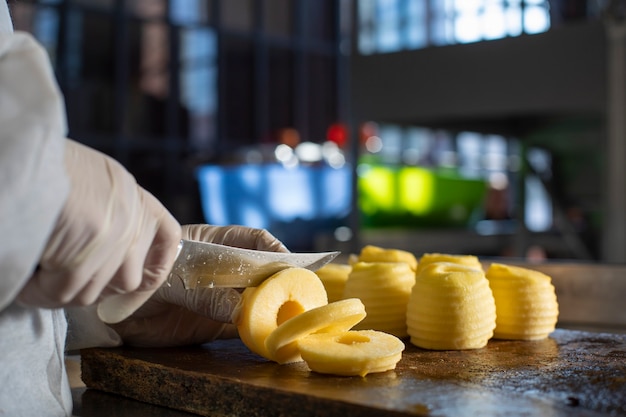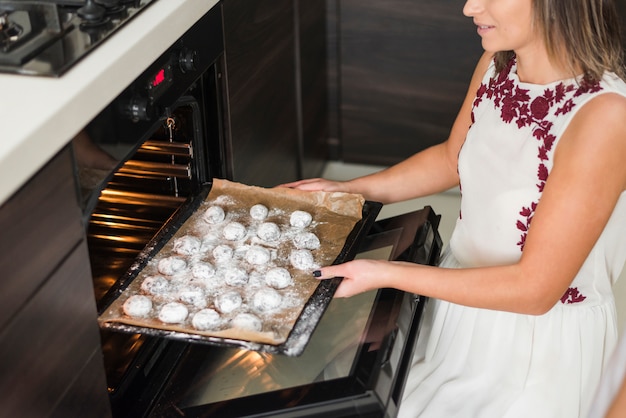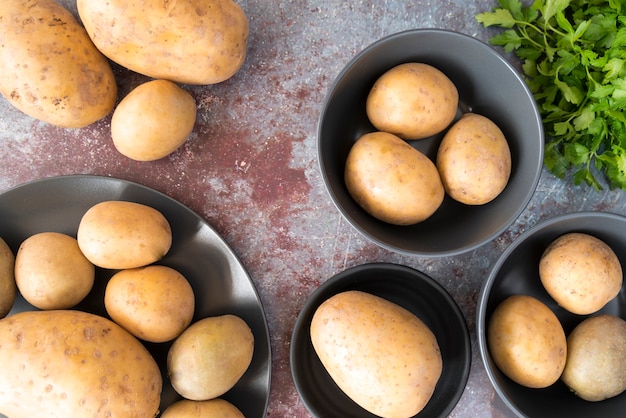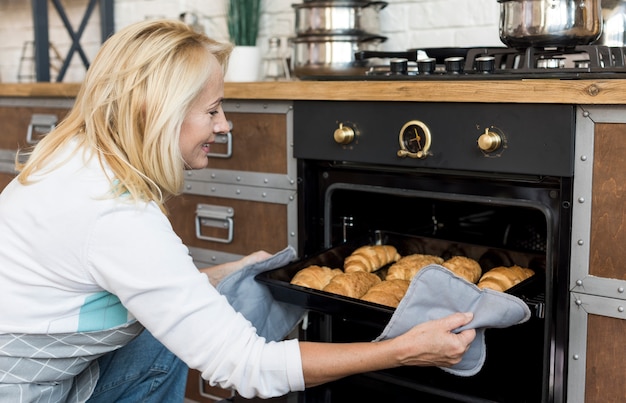Ah, roast potatoes. The golden, crispy, fluffy side dish that elevates any Sunday roast to legendary status. But achieving that perfect potato is a bit of a culinary dance, a delicate balance of temperature, potato type, size, and timing. You can't just chuck some spuds in the oven and expect magic. It takes a little know-how, a bit of practice, and maybe a dash of potato love.
Over the years, I've learned a thing or two about baking potatoes. I've experienced triumphs – those moments when the potatoes were so perfectly crisp and fluffy, they practically melted in my mouth. But I've also endured my share of mishaps – undercooked, mushy potatoes that left me questioning my potato baking skills.
But fear not, fellow potato enthusiasts! I'm here to share my hard-earned wisdom, my tried-and-true techniques, and some insider tips that will help you unlock the secrets of perfect roast potatoes. Let's embark on this potato baking journey together, and trust me, it'll be a delicious one.
(Part 1) The Potatoes: Your Canvas

Imagine you're an artist. You wouldn't start painting a masterpiece without the right canvas, would you? The same principle applies to roast potatoes. You need the right potatoes to create a culinary masterpiece. And for me, that means maris piper potatoes. They're the classic choice for a reason. They hold their shape beautifully, they've got that lovely floury texture that's perfect for creating those crispy edges, and they have a subtle sweetness that complements any roast.
But don't just grab any old Maris Piper you find. Like actors in a play, you need to choose the right potatoes for the role.
choosing the right potatoes: A Cast of Characters
It's all about choosing the right potatoes for the role.
- Size Matters: A medium-sized spud, think golf ball to tennis ball size, is your ideal player. They'll cook through evenly and have a nice surface area for that glorious browning. Tiny potatoes will cook too quickly and become dry, and giant potatoes will take forever and might end up undercooked in the middle.
- Avoid the Green Stuff: Ever seen those green bits on potatoes? That's a sign they've been exposed to sunlight, and it can make them taste bitter. Choose potatoes with smooth, unblemished skin. They'll have a more neutral flavour and cook better.
Once you've got your perfect potatoes, it's time to get them ready for their big performance.
Prepping Your Potatoes for Baking: Setting the Stage
Prepping your potatoes is like setting the stage for a performance. You want everything ready to go, so your potatoes can shine.
- Washing is Key: A good scrub with a brush or a scourer will remove any dirt or lingering grime. You don't want any unexpected surprises lurking beneath the skin.
- Don't Peel Them (Unless…): The skin adds flavour and texture, so leave it on. But if you prefer a smoother finish, feel free to peel them. But personally, I think the skin makes for a more rustic and satisfying bite.
- The Boil is the Foundation: A good old-fashioned boil is the foundation for the perfect roast potato. It softens the potatoes and helps them absorb the fat later on, which is key for creating those crispy edges.
(Part 2) The Art of the Boil: Laying the Foundation

Now, we're getting into the heart of the matter – the boiling process. It might seem like a simple step, but it's crucial. Think of it as laying the foundation for a house – if you get it wrong, the whole thing could crumble.
Boiling Time: Finding the Sweet Spot
The boiling time depends on the size of your potatoes, so pay attention! Here's a general rule of thumb:
- small potatoes: About 10-15 minutes
- Medium Potatoes: Around 15-20 minutes
- Large Potatoes: 20-25 minutes
You'll know they're ready when they're starting to soften and a fork can pierce them easily. But don't overcook them! They should still have a little bit of firmness left.
The Importance of Parboiling: A Secret Weapon
Now, this is where things get interesting. Parboiling is a crucial step, especially if you want those super crispy edges. It's about partially cooking the potatoes, which helps them to absorb the fat later on and develop that delicious, golden crust.
Here's the parboiling process in detail:
- The Water Needs to Be Boiling: Don't even think about chucking those potatoes into cold water. It'll take forever for them to cook through. Bring the water to a rolling boil before adding your potatoes.
- Don’t Crowd the Pot: Give those potatoes some space. Crowding them together will prevent them from cooking evenly. If you have a large pot, that's great! If not, you can always boil them in batches.
- Don’t Overcook Them: Keep an eye on the timer. You want them to be partially cooked, but not mushy. As soon as they’re starting to soften, drain them immediately.
Let’s Talk Fat: The Golden Elixir
Now, we're ready for the real magic to happen. Fat is the key to those glorious crispy edges. But what kind of fat should you use? Well, that's up to you! It's a matter of personal preference.
Here are some of my favourites:
- Goose Fat: The classic choice. It gives a rich, buttery flavour and creates the crispiest potatoes imaginable.
- Duck Fat: Another excellent option. It’s a bit less intense than goose fat, but still produces a beautiful golden crust.
- Olive Oil: If you’re looking for a lighter option, olive oil is a great choice. It has a lovely flavour and adds a nice golden hue to your potatoes.
- vegetable oil: A good all-rounder. It’s neutral in flavour and works well for roasting potatoes.
The amount of fat you use will depend on the size of your potatoes and your personal preference. You want enough to coat them well, but not so much that they’re swimming in it.
(Part 3) roasting time: The Final Act

Now, the moment of truth. It’s time to get those potatoes into the oven and let them transform into culinary masterpieces.
Getting Ready for the Oven: The Grand Entrance
Before you pop those potatoes in the oven, there are a few things you need to do to ensure they have a smooth and successful performance.
- Preheat the Oven: Always preheat your oven to a high temperature. I usually go for 200°C (400°F) for that intense browning.
- Choose Your Roasting Dish: A large roasting dish or baking sheet will work perfectly. Make sure it’s big enough to spread the potatoes out in a single layer so they cook evenly.
- Coat Them Well: Toss the potatoes in the fat and season them generously. I like to use salt, pepper, and a sprinkle of herbs, but feel free to experiment with different seasonings.
How Long to Roast Potatoes: The Countdown
Okay, here's the question that keeps everyone guessing: how long do you roast those beauties for? Well, it depends on the size of the potatoes, the temperature of your oven, and how crispy you want them. But here's a good starting point:
| Potato Size | Roasting Time |
|---|---|
| Small | 30-40 minutes |
| Medium | 40-50 minutes |
| Large | 50-60 minutes |
Don’t be afraid to check on them every 15-20 minutes. You want them to be golden brown and crispy on the outside, but still fluffy on the inside. If you’re not sure, give them a gentle poke with a fork. If it goes in easily and the potatoes are golden brown, they’re ready!
Tips for Perfectly Roasted Potatoes: Mastering the Craft
Here are a few tips to help you achieve potato perfection and avoid those common potato baking mishaps:
- Don’t Overcrowd the Dish: Give those potatoes room to breathe. Crowding them together will make them steam instead of roast.
- Toss Them Regularly: Every 15-20 minutes, toss the potatoes around to ensure they cook evenly and get nice and crispy on all sides.
- Don’t Be Afraid to Raise the Heat: If you want extra crispy potatoes, increase the oven temperature to 220°C (425°F) for the last 10-15 minutes of cooking.
- Rest Before Serving: Once the potatoes are cooked, let them rest for a few minutes before serving. This will allow the steam to escape and help them to become even crispier.
(Part 4) The Golden Brown Finish: A Masterclass
We're getting into the finer points now. We’ve talked about boiling, parboiling, roasting – now let’s talk about the art of achieving that stunning golden brown finish that screams “perfect roast potatoes!”
The Importance of High Heat: Amplifying the Browning
Remember that preheating your oven to a high temperature is key. Those intense temperatures are what help to create the crispy exterior we all crave.
The Magic of Fat: Creating a Barrier
Fat is your best friend here. It helps to create a barrier between the potato and the oven heat, allowing the inside to cook through without burning the outside. The fat also helps to brown the potatoes beautifully.
Timing is Everything: That Final Push
Don’t be afraid to raise the oven temperature slightly during the last 10-15 minutes of cooking. This will give your potatoes that extra boost of browning and crispness.
The Finishing Touches: Adding Flavor and Flair
Now, this is where you can really have some fun and personalize your roast potatoes.
- A Sprinkle of Rosemary: A classic combination. The rosemary adds a lovely herbal aroma and flavour.
- Garlic and Herbs: Add some chopped garlic and your favourite herbs for a fragrant and flavourful twist.
- Lemon and Thyme: A tangy and herbaceous combination that’s perfect for summer.
(Part 5) Beyond the Classic Roast: Exploring Other Options
Okay, I know you're probably thinking, “But I already know how to make roast potatoes!” And you're right, it's a classic for a reason. But there's a whole world of potato possibilities out there, and I'm here to expand your horizons. Let's explore some alternative ways to bake those spuds and elevate your potato game.
Garlic and Herb Roasted Potatoes: Aromatic Delights
This twist on the classic roast potato is both simple and delicious. Instead of just salt and pepper, we're going to add some aromatic garlic and herbs for a burst of flavour. Here’s what you need:
- Choose Your Herbs: Rosemary, thyme, oregano, parsley – the possibilities are endless! Pick your favourites or experiment with different combinations.
- Add the Garlic: Finely chop some garlic cloves and add them to the fat along with your herbs. This will infuse the fat with delicious garlic flavour.
- Roast as Usual: Follow the same roasting instructions as for classic roast potatoes. The garlic and herbs will add a lovely aroma and flavour to your potatoes.
Honey and Mustard Roasted Potatoes: Sweet and Tangy
Now, this is a sweet and tangy twist on the classic roast potato. The honey adds a touch of sweetness, while the mustard provides a sharp, tangy flavour. Here’s how to make it:
- Make the Glaze: Combine some honey, mustard, and a little bit of olive oil in a bowl. You can add a pinch of salt and pepper to taste.
- Coat the Potatoes: Toss the parboiled potatoes in the honey and mustard glaze and spread them out on a baking sheet.
- Roast Until Crispy: Roast the potatoes in a preheated oven at 200°C (400°F) for about 40-50 minutes, or until they’re golden brown and crispy.
Roast Potatoes with Paprika and Smoked Paprika: A Touch of Heat
Now, this recipe is for those who like a bit of heat. The paprika adds a warm, smoky flavour to the potatoes, while the smoked paprika adds a touch of depth. Here’s what you need to do:
- Get the Spices: Grab some regular paprika and smoked paprika. The amount you use will depend on how much heat you like. Start with a teaspoon of each and adjust to your taste.
- Season the Potatoes: Toss the parboiled potatoes with olive oil, salt, pepper, paprika, and smoked paprika.
- Roast to Perfection: Roast the potatoes in a preheated oven at 200°C (400°F) for about 40-50 minutes, or until they’re golden brown and crispy.
(Part 6) Potato Baking Mishaps: Learning From Our Mistakes
Okay, let’s be real. We’ve all been there. We’ve all had those moments where the potatoes just don’t turn out the way we hoped. But don’t worry! Every culinary disaster is an opportunity to learn and grow.
The Mushy Potato: A Case of Overcooking
It’s a sad sight – those beautiful potatoes, transformed into a soggy mess. This is usually the result of overcooking. The key is to keep a close eye on them and remove them from the heat as soon as they’re starting to soften.
The Undercooked Potato: A Bit of Patience Required
On the other hand, sometimes those potatoes just aren’t quite done. They might still be a bit hard and not as golden brown as we’d like. The solution? Pop them back in the oven for a bit longer. Just make sure to toss them every 10-15 minutes so they cook evenly.
The Burnt Potato: A Lesson in Oven Control
Oh, the horror! Those crispy edges have turned into a charred mess. This usually happens when the oven temperature is too high or the potatoes are crammed together. Next time, keep a closer eye on the oven and make sure those potatoes have plenty of space to breathe.
The Bland Potato: A Cry for Seasoning
Sometimes those potatoes just don’t have enough flavour. The solution is simple – more seasoning! Don’t be afraid to be generous with salt, pepper, and herbs. You can also add a splash of lemon juice or a pinch of garlic powder for an extra kick.
(Part 7) FAQs: Your Potato Baking Questions Answered
You’ve got questions. I’ve got answers. Let’s dive into the world of potato baking FAQs.
1. What if I don’t have goose fat or duck fat?
Don’t worry! Olive oil, vegetable oil, or even sunflower oil will work perfectly. Just make sure it’s a good quality oil that can withstand high temperatures.
2. Can I roast potatoes without boiling them first?
Absolutely! You can roast potatoes directly from raw, but they’ll take longer to cook and might not be as crispy. I personally prefer to boil them first, as it helps to ensure they’re cooked through and creates a lovely, fluffy texture.
3. How do I know if my potatoes are cooked through?
The best way to check is to poke them with a fork. If it goes in easily and the potatoes are golden brown, they’re ready! If they’re still a bit firm, give them a few more minutes in the oven.
4. Can I make roast potatoes ahead of time?
Yes, you can! Just roast them as usual, and then let them cool completely. Store them in an airtight container in the refrigerator for up to 2 days. When you’re ready to serve, reheat them in a preheated oven at 180°C (350°F) for about 15-20 minutes.
5. Can I roast potatoes with other vegetables?
Absolutely! Roast potatoes are a great companion for other root vegetables like carrots, parsnips, and sweet potatoes. Just make sure to cut the vegetables into similar sizes so they cook evenly.
(Part 8) The Potato Baking Journey: A Never-Ending Adventure
There you have it, folks. My guide to achieving potato baking perfection. But remember, this is just the beginning. The journey of potato baking is a never-ending adventure. Experiment with different types of potatoes, seasonings, and cooking methods. Be bold, be creative, and most importantly, have fun! After all, a little bit of potato magic can make any meal more delicious.
So, grab your potatoes, your favourite fat, and your seasonings. Get ready to embark on this delicious journey, and trust me, you won't regret it.
Everyone is watching

Perfect Rice Every Time: The Ultimate Guide to Cooking Rice
Cooking TipsAs a self-proclaimed foodie, I've always been a bit obsessed with rice. It's the foundation of countless cuisi...

Prime Rib Roast Cooking Time Chart: Per Pound Guide
Cooking TipsPrime rib roast. Just the name conjures images of lavish dinners, crackling fires, and hearty laughter. It’s ...

The Ultimate Guide to Cooking Asparagus: Tips, Techniques, and Recipes
Cooking TipsAsparagus. The mere mention of this spring delicacy conjures up images of vibrant green spears, crisp and burs...

Ultimate Guide to Cooking the Perfect Thanksgiving Turkey
Cooking TipsThanksgiving. Just the word conjures up images of overflowing tables laden with delicious food, the scent of r...

How Long to Bake Potatoes in the Oven (Perfect Every Time)
Cooking TipsBaked potatoes are a staple in my kitchen. They're incredibly versatile, delicious, and surprisingly easy to m...
